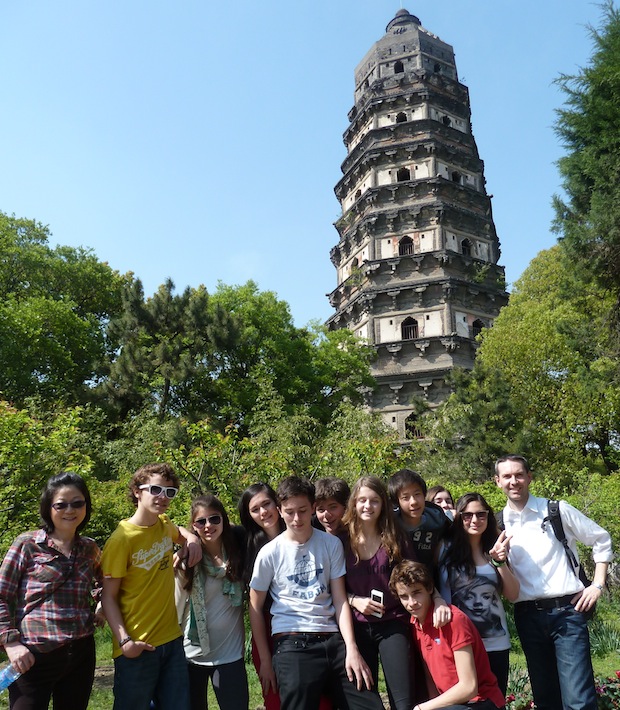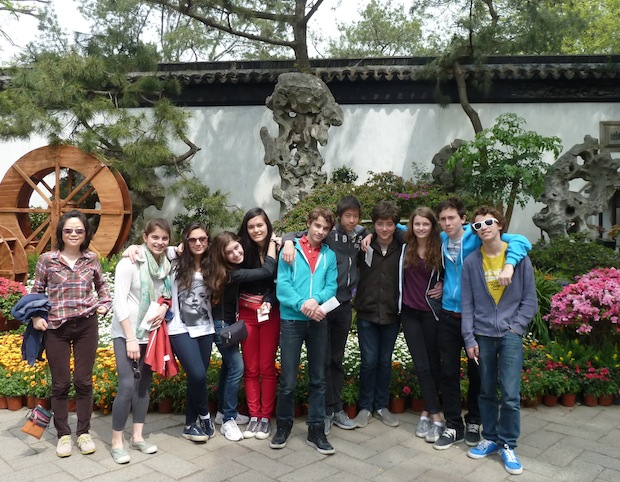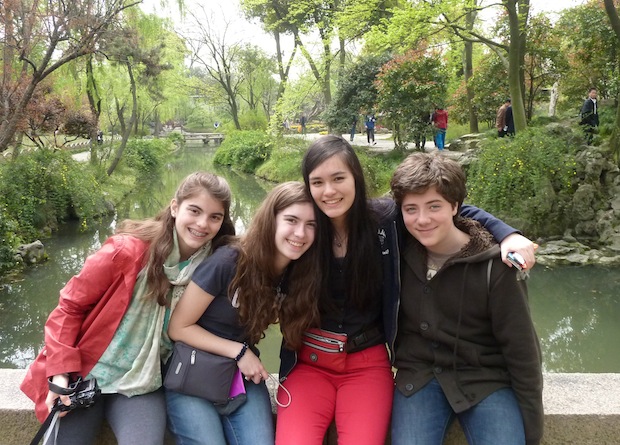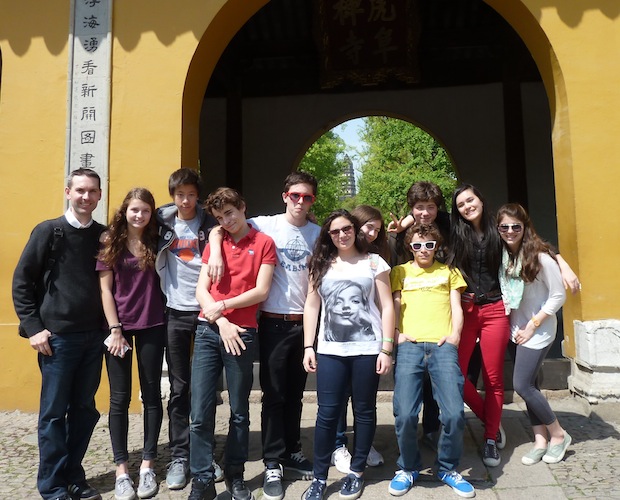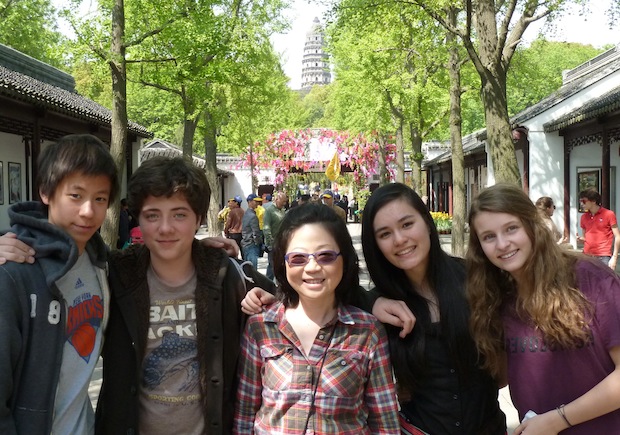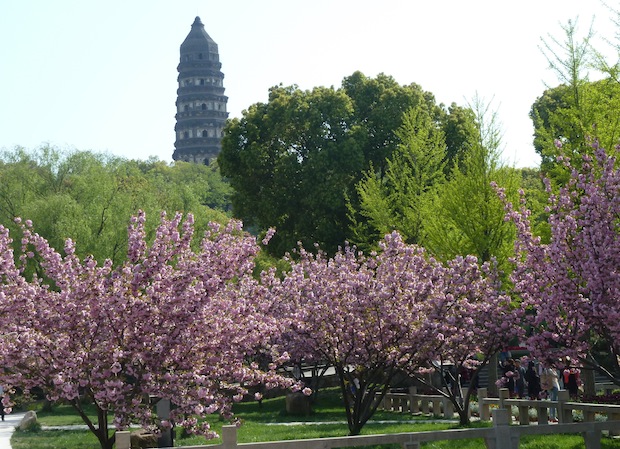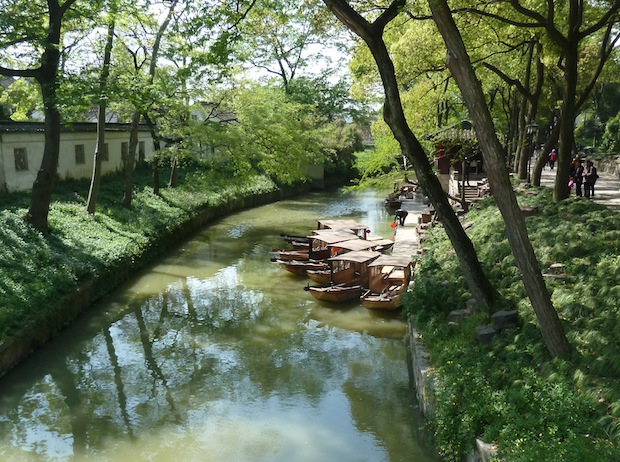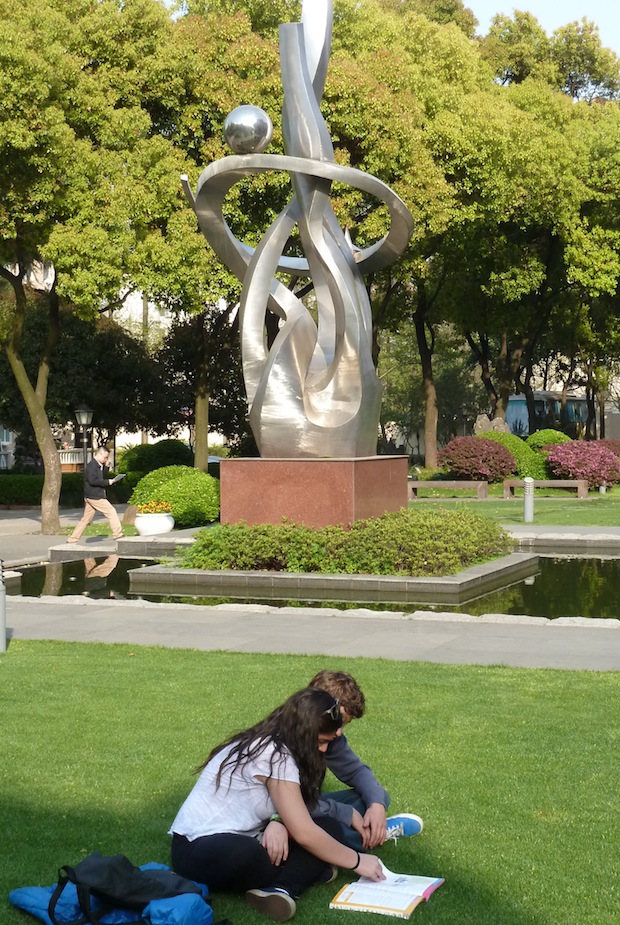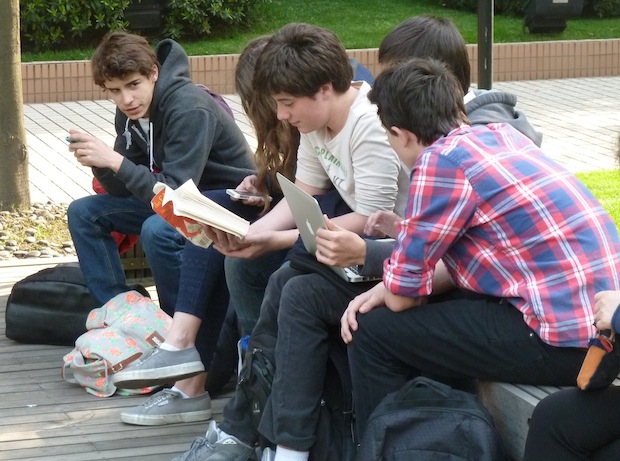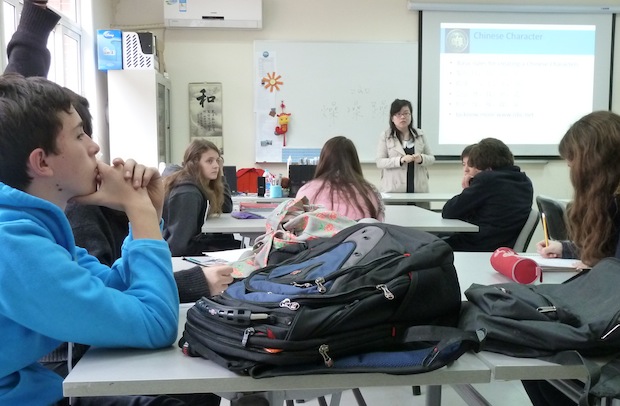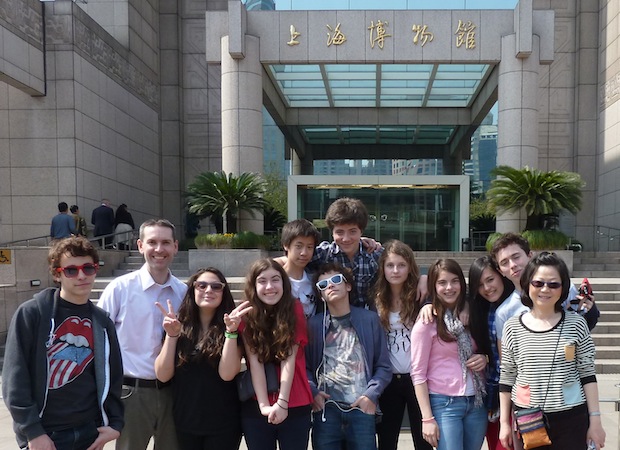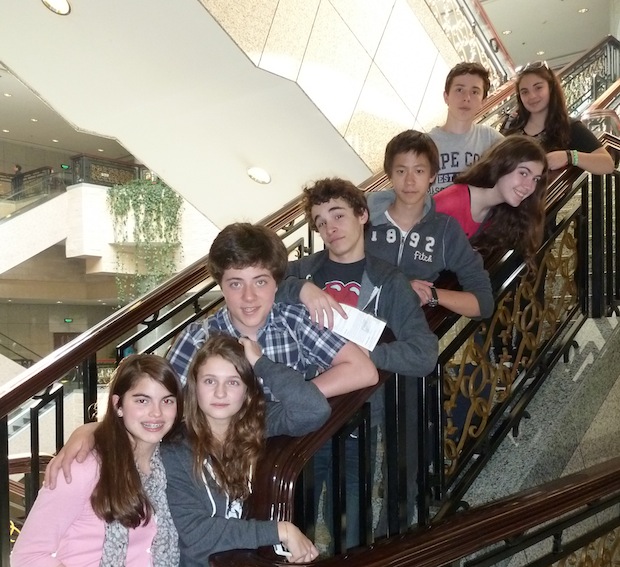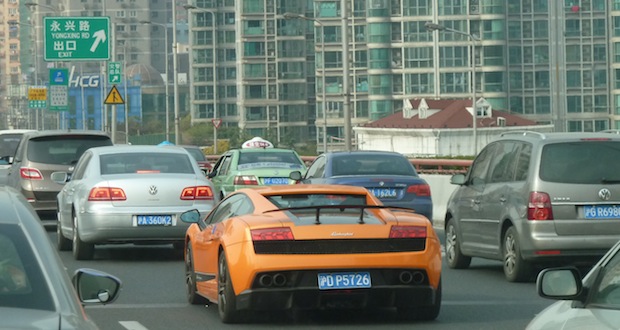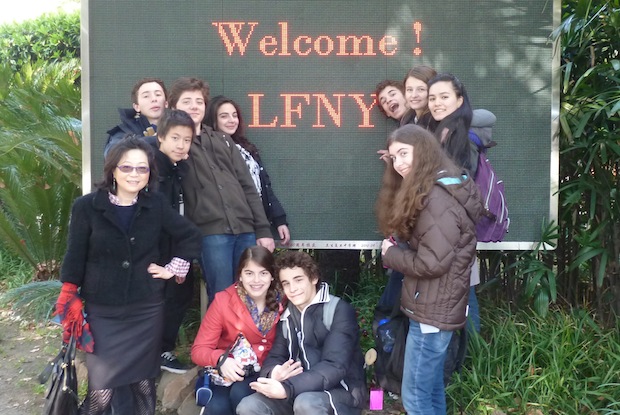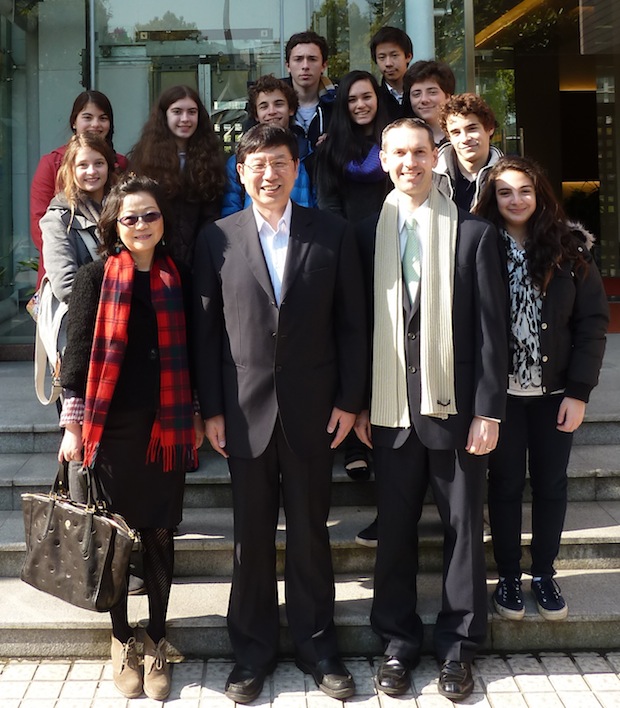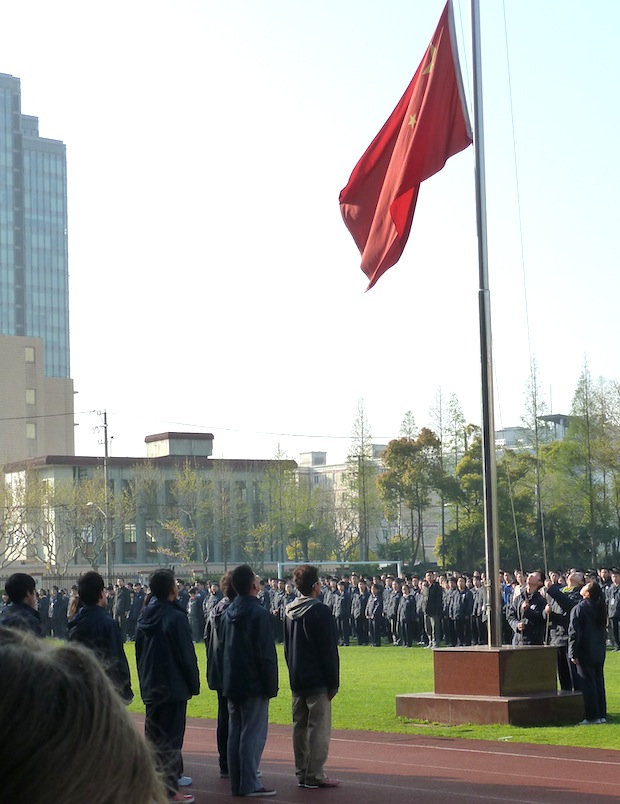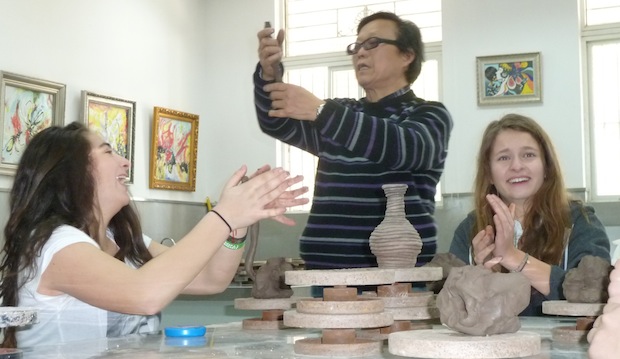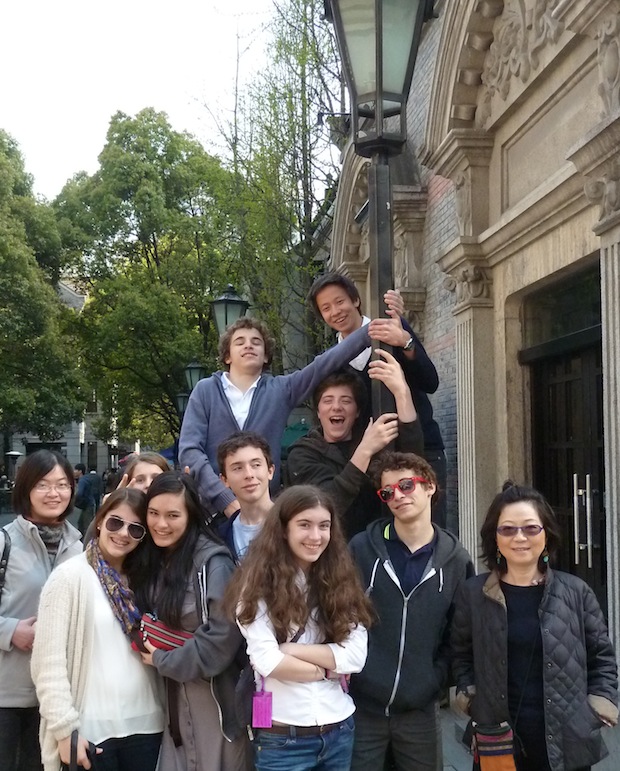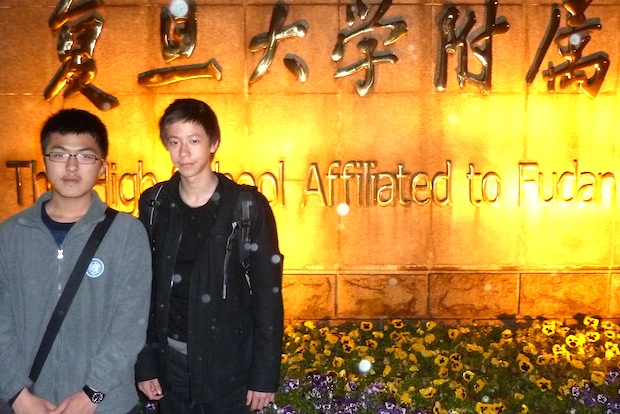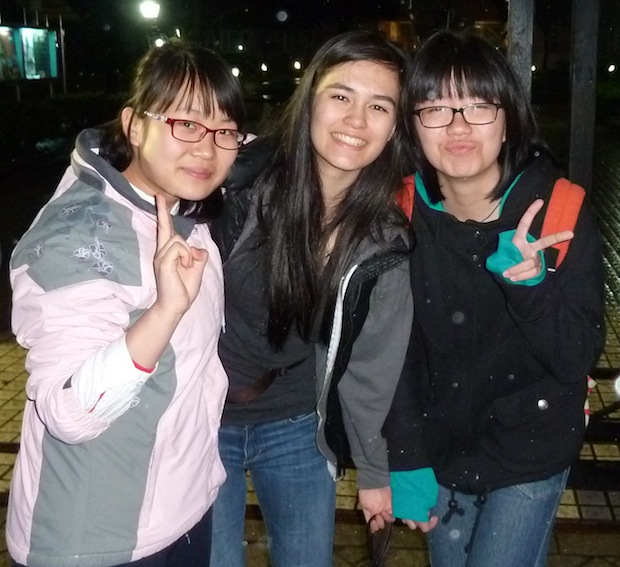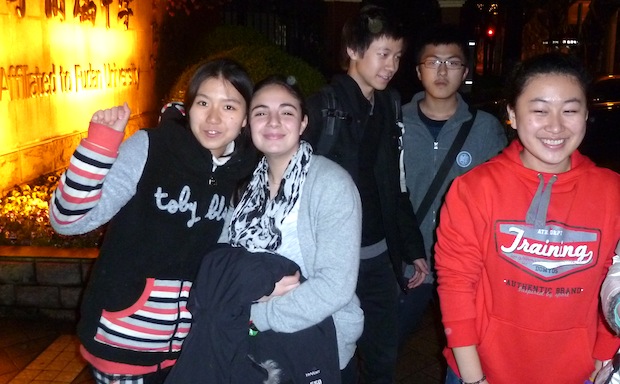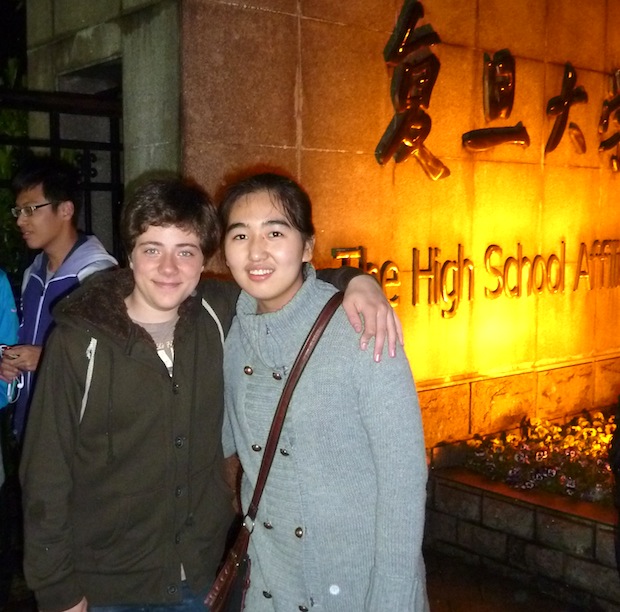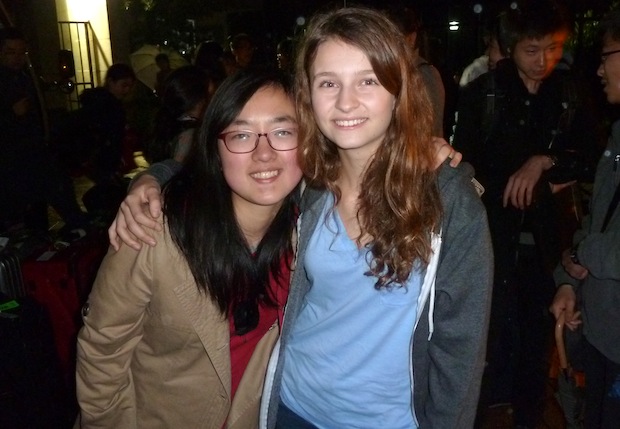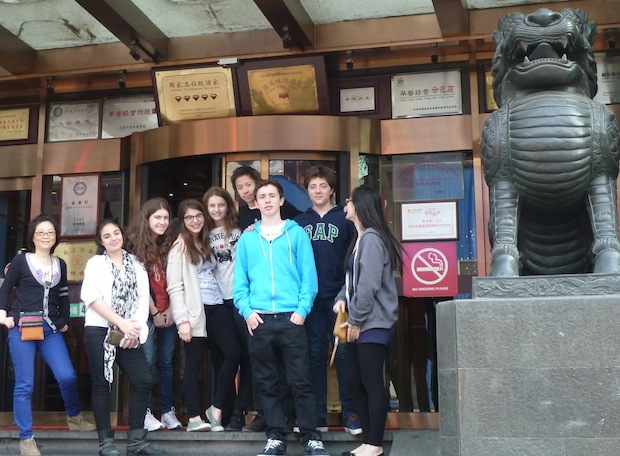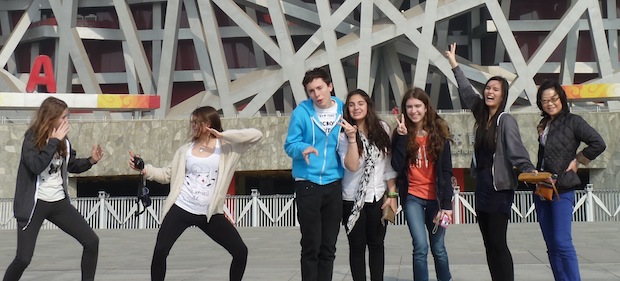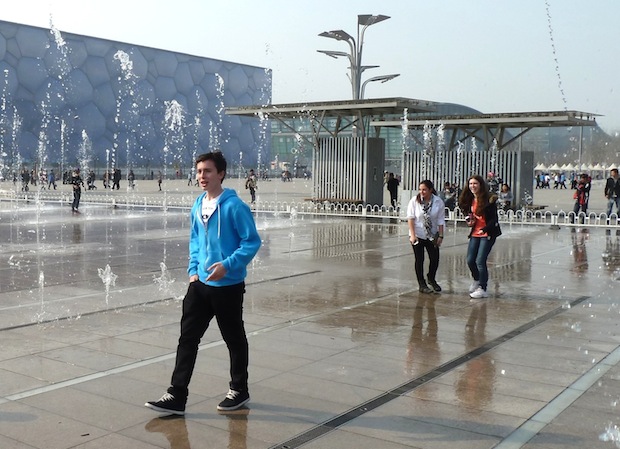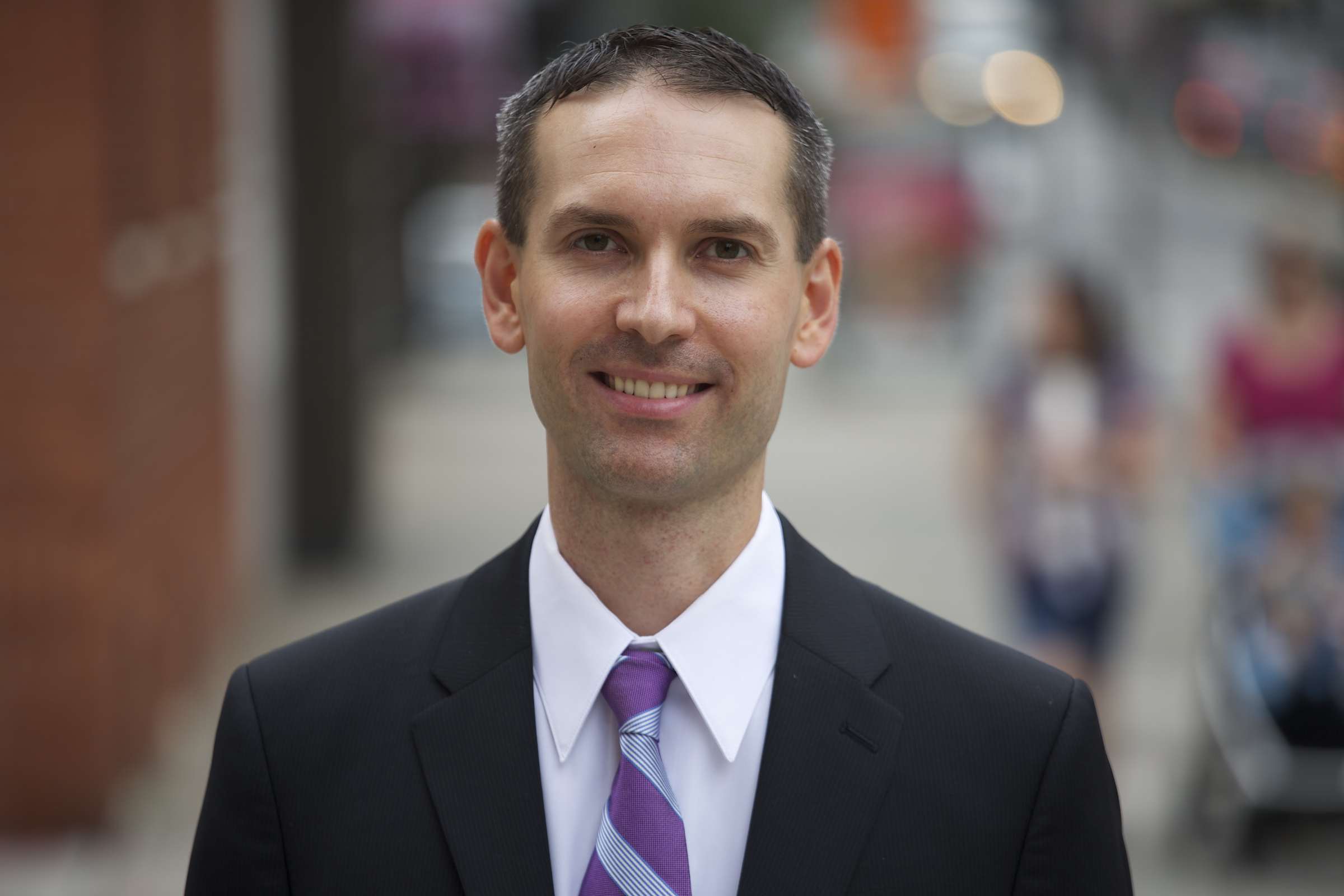As the students are reaching the end of their stay, they are sharing with us some impressions of their experience abroad.
Q: What has made the strongest impression on you so far in China?
Hélène C.: “The strongest impression for me was the Pearl Tower. I will never forget it. There I realized how enormous Shanghai really is. I will never forget the thrill of standing on the glass floor over 250 meters of nothing!”
Leo C.: “My strongest impression came during the weekly flag-raising ceremony. Two thousand students gathered on their sports field perfectly lined up by class, while the national anthem played and the communist flag rose above the assembly.”
Mariana S.: “The kindness of everybody, even strangers, and the pollution in Beijing.”
Victor C.: “There is far more pollution in China than I thought.”
Eugénie P.: “My strongest impressions were the food and the Great Wall.”
Clément B.: “The extent and the urbanization of Shanghai, which is bigger and more modern than New York.”
Etienne G.: “For me, the strongest, most stunning impression of China has to be the Great Wall.”
Oscar C.: “Je pense que le lever du drapeau le matin fut très impressionnant. Il y avait aussi beaucoup de pollution.”
How has your experience compared with your expectations before coming?
Hélène C.: “I expected Shanghai to look like Beijing, but it is a lot prettier! Shanghai has more green spaces.”
Leo C.: “I think my experience met my expectations. I visit Taiwan every summer and must say China is like a mix of Taiwan and America.”
Mariana S.: “Before coming I was nervous…but once I got here I realized there was nothing to worry about. My host family has been so nice. I also didn’t think that China was so influenced by America.”
Victor C.: “Before coming I thought Chinese kids were very closed and did not talk much. But in fact, they are very nice and open, so I made some friends here.”
Clément B.: “I thought China would be much less influenced by Western countries. It is actually much more influenced by the US culturally and economically than I had thought.”
Etienne G.: “I expected a much more exotic country; however, I realized that they are not much different from us.”
Oscar C.: “Je m’imaginais beaucoup de stéréotypes sur les Chinois, mais en fait, ils sont tous uniques.”
Describe daily life during your homestay with your correspondent from Fudan H.S.
Hélène C.: “My host family is extremely nice and always worries if I like anything or not! They are very welcoming.”
Mariana S.: “My family has been great! The student is so sweet and her mother, even though we can’t communicate very well has been very nice as well. I will definitely miss them when we leave.”
Victor C.: “It was great; they treated me like one of their sons. The mother cooked so well, and I had a bedroom of my own.”
Eugenie P.: “It’s fun; I would say it’s life changing. We can see the difference between our cultures. The parents are so nice and traditional.”
Clément B.: “My host family was very nice and took great care of me. They always inquire about my health and about my hunger.”
Etienne G.: “The best way to answer this question is to say that it was life changing.”
Compare the education at Fudan to that at the LFNY.
Hélène C.: “In Fudan, the students let the teacher talk and teach her lesson, then they can ask questions. At the Lycée, there is more interaction betwen teachers and students.”
Leo C.: “The educational systems are very different. I noticed that the teachers did a lot more talking in Fudan and the students seldom participated. However, when the teacher did ask a question, no one raised their hand; the teacher selected a student, who stood to answer.”
Mariana S.: “Chinese discipline is known for being strict and it definitely reflects on the work done by the students. There’s maybe more respect for the teachers here, but there’s a huge difference in the way classes are taught. In the US, you are expected to participate, whereas in China teachers will speak non-stop while the students listen.”
Victor C.: “The education in Fudan is good, but the students have too much homework compared to the LFNY. My exchange student works from 5:00 to 10:00 every night!”
Eugenie P.: “Fudan is a huge campus with a lot of green places.”
How are your language skills improving?
Hélène C.: “I am learning words for everyday use and also trying to recognize characters around the city.”
Leo C.: “My listening skills are improving a lot thanks to my host family. I try to listen to their conversations and I ask about the words and phrases I don’t know.”
Oscar C.: “My speaking skills are improving a lot as I try to speak Chinese most of the time. Speaking is much easier than understanding, they talk really fast.”
Day 9
Today Fudan organized a field trip for the Lycée group to Suzhou, which is 90 minutes outside Shanghai. We visited the beautiful gardens in the city. The photos tell the story. Subsequently, we visited the Tiger Hill. With daily termperatures in the 60s, spring has blossomed into a polychromatic landscape in and around the city.
The Humble Adminstrator’s Garden is a man-made garden with pavillions erected on rock outcroppings surrounded by ponds and linked with quaint stone bridges.
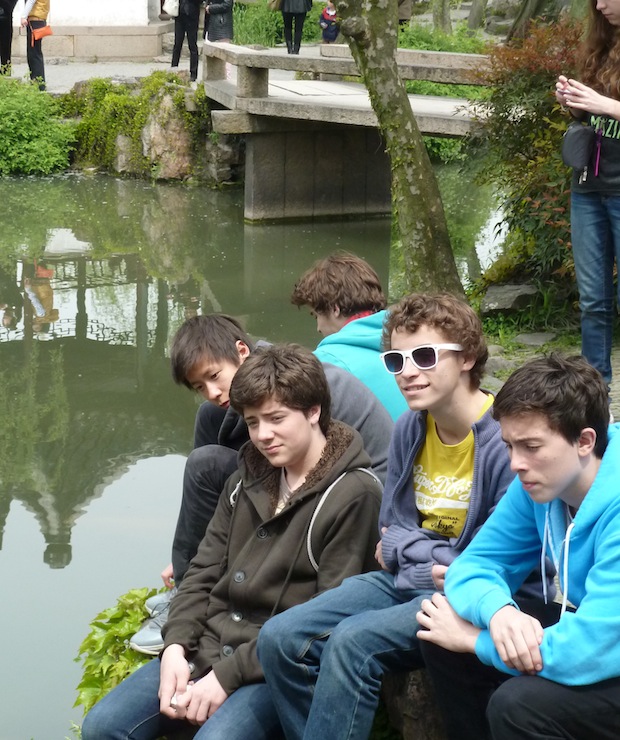 Contemplation: Taking it all in.
Contemplation: Taking it all in.
Tiger Hill incorporates a pagoda built into a hill to resemble a tiger. At its summit the tower leans over 2 degrees, thus rendering its interior off limits to visitors. Nevertheless, the surrounding gardens provided us with ample eye candy.
Day 8
We spent Wednesday exploring the Pudong section of Shanghai. It has emerged as the city’s central business district since 1990 as part of Shanghai’s urban development strategy. We confronted our fears by ascending the Oriental Pearl Tower, then studied Shanghai’s history. Our day culminated at the Chinese Art Museum of Shanghai where students reviewed cartoons they had watched in class and learned a new idiom from Ms. Wei.
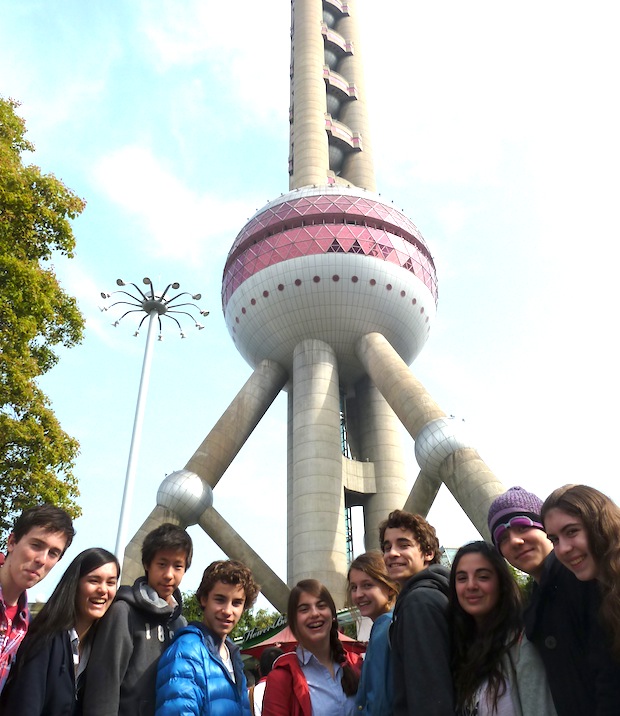
Shanghai Oriental Pearl Radio & TV Tower, Pudong District.
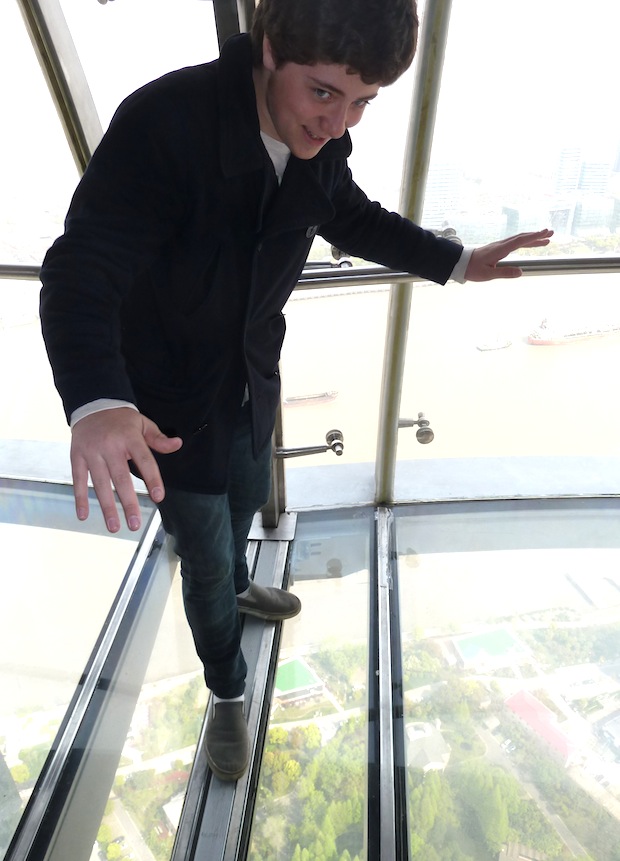
Careful balancing act on the transparent observatory.
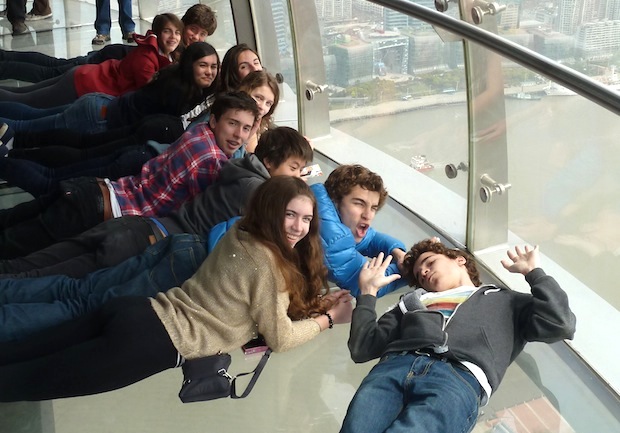
Lounging above Shanghai (elevation = 259 m.)
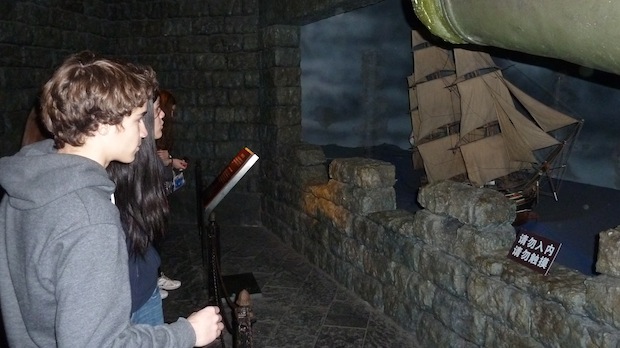
Shanghai Municipal History Museum: Recreation of ships partaking in the First Opium War (1839-1842), which forcibly opened China to the West and resulted in “semi-colonization.”
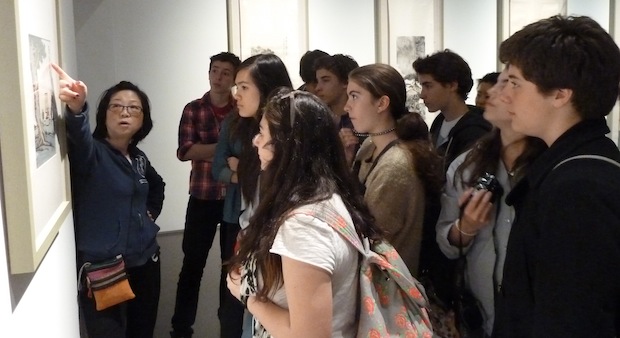
Ms. Wei explains a Chinese idiom pertaining to water wells and the lesson of appreciation & generosity to students.
Day 7
Immersed in the academic culture of Fudan H.S., our students have absorbed their buddies’ study habits and work ethic. They take every opportunity to review for their brevet blanc between classes and while waiting to return home with their correspondent.
Day 6
On the second day of our exchange with Fudan H.S., students attended classes with their correspondent, according to their individual schedule. A list of the courses our students sampled includes: Ancient Mandarin, Physics, Math, History, (all in Chinese) and English. Then we were invited to visit the Fudan International School, founded in 2006 to educate foreigners in Shanghai. Lycée students attended Ms. Zhang’s Mandarin course. After lunch we toured the Shanghai Museum, which boasts an impressive collection of Chinese art from Ancient China (1800BC) to the end of the Qing Dynasty (1911). Following our visit we returned to Fudan to reunite students with their “buddies.”
Specialized Mandarin Class for LFNY students.
Shanghai chic (even in traffic!)
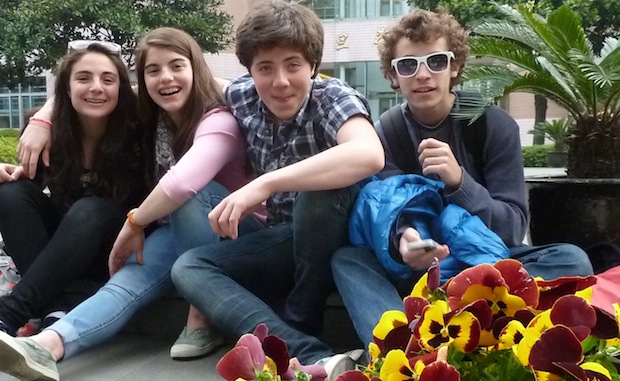
Awaiting correspondents on Fudan campus.
Day 5
On Sunday, Fudan H.S. welcomed the Lycée to the school as it held a full day of classes to make up for a holiday last week.
Principal Zheng greeted us cordially and International Exchange Coordinator Mr. Qian hosted us on campus.
The day began with the flag-raising ceremony and morning assembly held on the school’s athletic field. Our own Gabrielle Curran gave a speech in Mandarin with Eugenie Perez providing consecutive translation for the 1300 students assembled. (All Fudan students are required to take English.) Impressed, Mr. Qian complimented Gabrielle’s near-native pronunciation.
Following our tour students received a lesson in pottery and were invited to show off their creativity. The Fudan art teacher presented dozens of works by his talented students.
Then students lunched with their correspondents before heading off to explore the French concession in Shanghai, which was founded in 1849 and lasted until 1943. Its current cafes were the perfect place for a goûter!
Day 4
We arrived in Shanghai after almost six hours on the TGV from Beijing. En route we crossed much Chinese countryside and passed through Nanjing, former capital of the Republic of China.
At Fudan, our bus pulled onto the school grounds to sounds of cheers and applause. On this rainy day, we appreciated the warm welcome our host families and Fudan staff provided us.
Heartfelt hugs renewed the bonds that students had formed in New York. Students went home to settle in with their correspondents and prepare for their first day of school–on Sunday!
Day 3
We have completed our third exhilirating day in the Chinese capital with students giving the cuisine rave reviews. Not an unremarkable feat given the gastronomic standards of Lycee families.
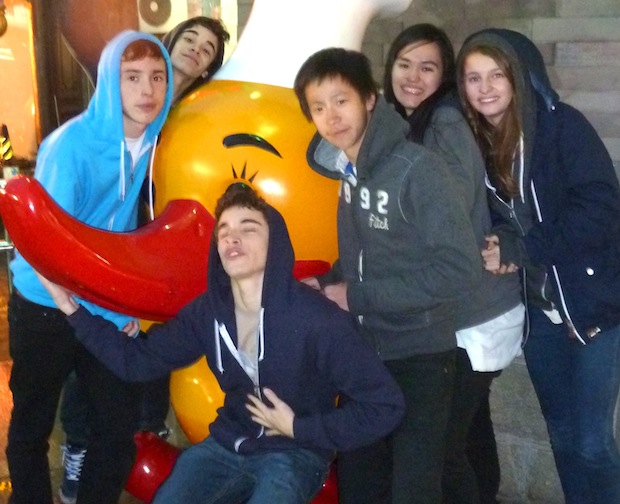
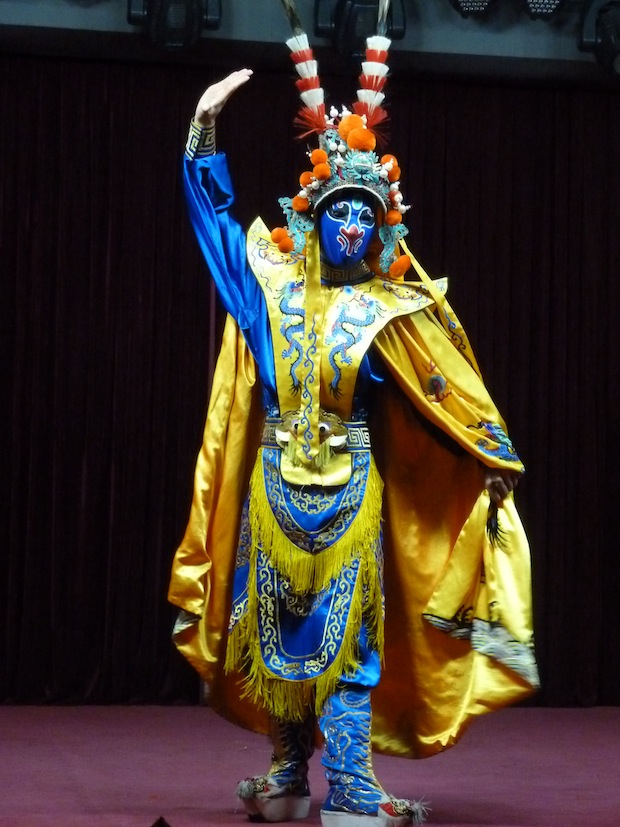
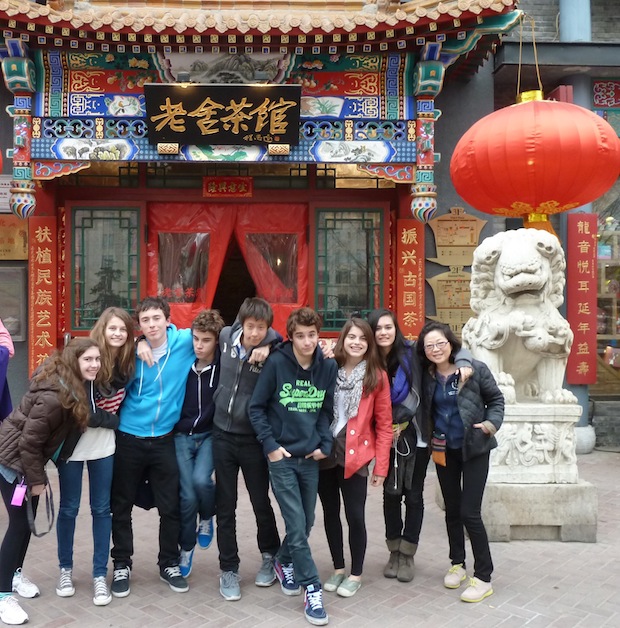
We began the day confronting the challenge of climbing the Great Wall on the outskirts of Beijing. Then we visited a cloisonne factory workshop to watch artisans craft ornate vases. In the afternoon, we watched a face mask performance at the LaoShe Teahouse, frequented by President George H.W. Bush and Dr. Henry Kissinger in the 1990s. We capped the day with a delectable Peking Duck dinner.
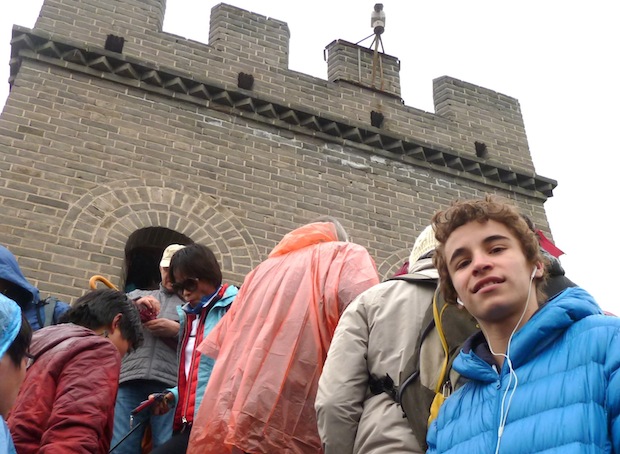
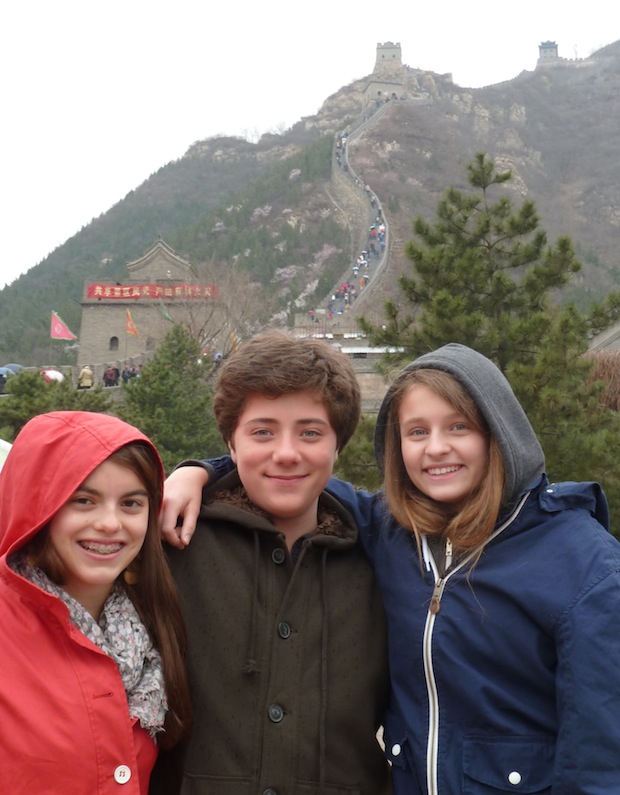
Next we part for Shanghai via the TGV to meet our exchange hosts at Fudan H.S. Stay tuned for part 2 of our Adventures in the Orient.
Day 2
We had another fantastic day touring Beijing.
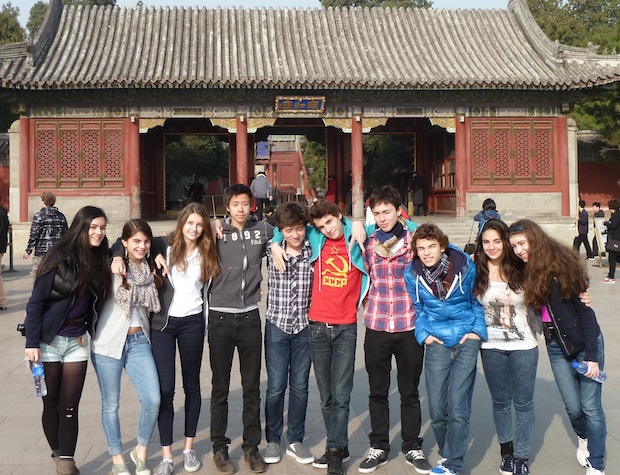
We visited the Imperial Summer Palace.
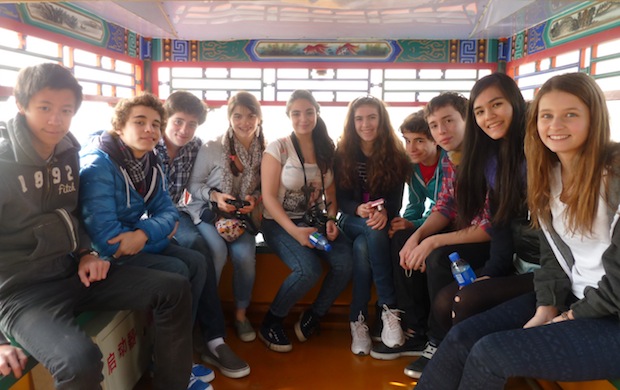
We took a dragon boat across Kunming Lake to Dragon Island where the Dowager Empress Cixi would sail.
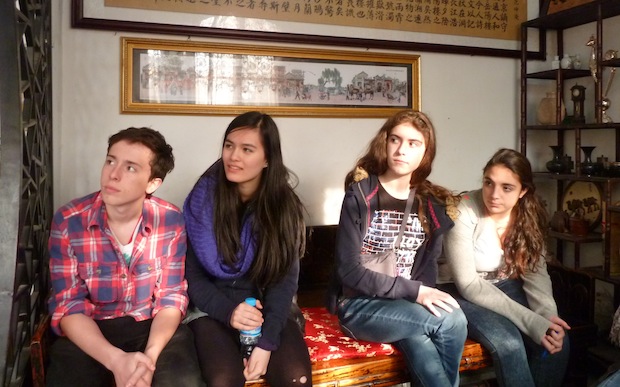
We were welcomed into the home of one of Mao’s Red Army generals who accompanied Mao Zedong on the Long March (1934-35).
We also visited the Imperial Forbidden City on Tiananmen Square and boarded a rickshaw convoy to visit the old historic courtyard quadrangle homes in a Hutang district of Beijing.
Day 1
I am pleased to report that we have successfully arrived in Beijing with 10 students from 3eme as we tour the capital for three days prior to traveling to Shanghai on Friday to complete our exchange with the High School affiliated with Fudan University.
Please find some photos from our visit to the Olympic Park (Water Cube & Bird’s Nest) and a group photo outside the restaurant where we had excellent dim sum.
About the Author :
Arthur Plaza holds a Ph.D in History and French Studies from New York University. He also studied at Sciences-Po and was awarded a Fulbright Fellowship to conduct research in France in 2004-2005. Part of his research was published in the collective volume entitled “Politiques de la laïcité au XXe siècle” (PUF, 2007). In addition, he has been an editorial assistant at the scholarly journal, French Politics, Culture & Society.


